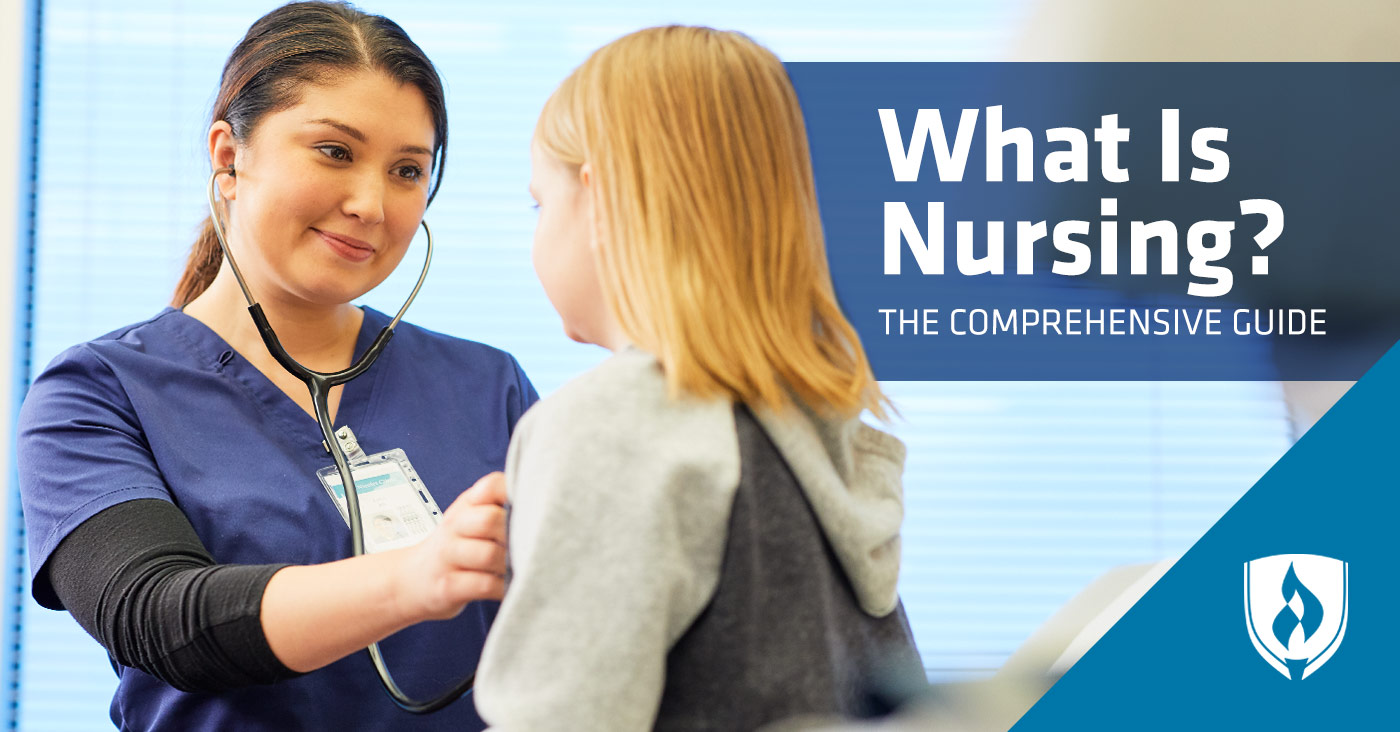
Nursing is no small topic to tackle, and if you’re not familiar with the industry it can be easy to get overwhelmed by the terminology, acronyms and the nuances of the field. Whether you’re strongly considering a nursing career or just curious about the landscape you’ve come to the right place to get it all figured out.
In this article we’ll attempt to comprehensively tackle the biggest nursing questions and topics. Everything from the most basic questions like, “What is nursing?” down to tips and advice for passing the NCLEX licensure exams. It’s all right here at your fingertips.
So whether you want to browse through the full list or jump right to the section that most intrigues you, let’s get started. And be sure to bookmark this resource for future reference!
Get Your Nursing School Questions Answered at a Nursing Information Session
Which nursing topic interests you?
Since you’re here, you likely have at least a basic understanding of what nursing is. It’s the professional field dedicated to the treatment of patients dealing with illnesses or injuries. But there’s a lot more to nursing beyond the basic dictionary definition. Nurses need to blend textbook knowledge on how the human body functions and how to execute treatment methods with an understanding of the emotional side of their patients in order to be effective.
What do nurses do? What are some common nursing job duties and responsibilities?
So what do nurses do, exactly? The short answer is: a lot. They tend to the needs of patients and their loved ones, assist physicians, prepare patients for procedures and generally keep healthcare facilities running smoothly. Of course, specific duties will vary depending on the facility where they work and the specific nursing role they’re in. Pediatric nurses, for instance, will spend more of their time explaining procedures to young patients and addressing the questions of their parents.
That said, there are several nursing responsibilities that apply in nearly any role. Duties like conducting patient assessments, educating patients, administering medication and treatments, and tending to the needs of patients and their families are common across the spectrum of nursing roles.
What is the nursing process?
No matter the specialization or role, the nursing process is a unified system for all nurses to follow. Essentially it is an approach to the scientific method that is modified for the nursing profession. The American Nurses Association breaks down the nursing process into the following five steps:1
Assessment: This is the first step for nearly any problem-solving approach. This refers to the systematic approach to gathering information about a patient, including physical, psychological, cultural and economic factors that may influence their diagnosis.
Diagnosis: This step is the process of weighing the information collected in the assessment step and using clinical judgment skills to identify what ails the patient, as well as any potential complicating factors. This is the foundation for starting a care plan.
Outcomes / Planning: This is the process of outlining the steps needed for patients to make progress, as well as the milestones patients may reach along the way.
Implementation: This step of the nursing process is fairly self-explanatory—it’s the actions carried out to execute a patient’s treatment plan.
Evaluation: This step is used to check in on the patient’s progress following treatment and adjust care plans as needed.
Where do nurses work?
There’s two ways to look at this question—geographically and in terms of facilities. Geographically, the nursing profession has a fairly universal spread. People need healthcare in nearly any location, which is great news for someone seeking flexibility in their working location. Whether you prefer a bustling urban center or the wide-open countryside, there’s a variety of potential opportunities available for nurses.
Nurses can also work in a variety of facilities and settings. The most common places to find nurses are hospitals, clinics, specialized treatment centers, assisted living facilities and—in the case of home healthcare nurses—potentially even your own neighbors’ homes.
While these settings cover the majority of places you’ll find nurses working in, there are some lesser-known locales out there. Check out our article, “Where Do Registered Nurses Work? 11 Places You Didn’t Know About” to learn more.
This is obviously an important question to ask for anyone considering a nursing education. Of course, whether or not a career is “good” is a subjective question that will depend heavily on your own preferences. That being said, there are several common factors you’ll want to consider.
Is nursing in demand?
One way to evaluate if nursing is a good career choice is to examine the job market for nurses. While economic conditions can change, nursing—and healthcare roles in general—appear to be strong options on this front.
The BLS projects employment of registered nurses to grow 15 percent from 2016 to 2026, which translates to roughly 438,000 new RNs in that time period.2 For LPNs, the BLS projects employment to grow by 12 percent—that’s just under 89,000 new nurses—from 2016 to 2026.2
Is the nursing shortage real?
If you’re researching a nursing career, you may have encountered articles or heard people talking about a potential nursing shortage and how it could be a strain on healthcare providers.
So is the nursing shortage real? Overall, there are several indicators that suggest the nursing shortage is a legitimate issue, but the severity will likely vary depending on where you live. According to a report from Moody’s Investors Services, the southern and western U.S. will be impacted more heavily by the nursing shortage than the rest of the country, with the highest prevalence in Georgia, Florida, Texas and California. The latter three states alone are predicted to account for nearly 40 percent of the nursing shortfall nationwide.3
The causes of this nursing shortage are pretty straightforward. The BLS attributes much of it to the large and aging baby boom generation—both the generation’s expanded need for healthcare services as they age and their collective retirements from the field are big factors driving demand.2
Want to learn more? Check out our article, “Nursing Shortage in America: What You’ll Need to Know in 2019.”
Would I make a good nurse?
Another way to determine whether nursing is a good career for you is to learn what it takes to succeed as a nurse. While many are able to learn the technical skills and techniques necessary, certain qualities and characteristics can make you a natural fit in the nursing field.
A good nurse is:
- A natural communicator
- Diligent
- Comfortable working on a team
- Compassionate
- Direct and assertive
- Positive
- Honest
As you can see, many of these characteristics revolve around people skills and a nurse’s ability to relate with their patients and coworkers. It’s not just a sense of kindness or compassion in their communication, either. Nurses will sometimes need to give a little “tough love” as they provide direct and assertive feedback or guidance for their patients.
The working nurses who possess these skills have certainly made an impression on the public. Gallup polling has shown that in 2018, 84 percent of Americans believed nurses to have “high” or “very high” ethical standards and levels of honesty—marking 17 consecutive years of nurses topping the rankings for these metrics.4
Curious about what else factors into being an effective nurse? Check out our article, “What Makes a Good Nurse? Experts Reveal What It Takes.”
What do nurses love about their work?
We know that the appeal of a nursing career isn’t limited to quantifiable statistics like salary or employment projections. So what are some of the hard-to-measure but still important factors nurses enjoy about their work? Let’s take a look at a few examples.
Nurses get to educate patients: Nurses work as informal advocates for their patients every day, and part of that advocacy is related to teaching them what they need to know. Nurses regularly inform patients about treatment options, explain behaviors that can improve their overall heath, and help translate complicated medical terminology.
“The best way to explain to a new nurse why advocacy is so important is to simply ask them if they have ever been a patient in a hospital or even a patient in a medical office,” says nurse practitioner Jill Beavers-Kirby. “Then I ask them if they felt intimidated by what the healthcare provider said because they often speak in medical lingo.”
There’s variety in nursing work: One major positive to life as a nurse is that their work can provide plenty of variety. For instance, just think of all the things in a given day that could land you in the emergency room. As you might imagine, ER nurses need to be more or less ready for anything. But it’s not just variety in the types of ailments you’ll encounter. The nursing field offers a plethora of interesting specializations and focus areas to pursue if you feel like you’re in a rut or want to try something new.
The potential for a condensed full-time schedule: While not universal, some nurses have the opportunity to work a condensed schedule—like four ten-hour days or three 12-hour days—which can provide for additional “weekend” time. This scheduling style is not for everyone, but having it as a relatively common option is considered an advantage to some.
Some patients leave a positive mark: At the end of the day, patients are people. Some can be difficult, most are unremarkable, but on occasion as a nurse you’ll get a chance to work with a patient who leaves a lasting, positive impact. Perhaps they exhibit an optimistic attitude in the face of a terrible prognosis, or maybe they just go above and beyond to say thanks for your work. Whatever it is, you aren’t likely to find the same emotional pull in other lines of work.
You help people for a living: There are plenty of jobs where you might feel detached from the work you do on a daily basis. But nursing is a career that keeps you grounded and connected with your community.
“There are not many careers where every day you can change a patient’s experience for the better,” says registered nurse Donna Matthezing, founder of personal flight nurse organization Compassionate Care in the Air.
Looking for more about what nurses do—and don’t—like about their work? Our article, “RNs Get Real About the Pros and Cons of Being a Nurse” will have you covered.
There are two primary ways to categorize nurses. One approach is through distinguishing them by their level of education or credential earned. The other approach is based on the type of specialized work the nurses do.
Types of nursing credentials
Nursing credentials and degrees can be a little confusing to sort out. There are several acronyms and job titles that are closely tied to specific degrees. Let’s dive in to sort things out.
Licensed Practical Nurses
What is an LPN? An LPN, or licensed practical nurse, is a type of nurse who typically works under the supervision of a registered nurse or another supervisor. They provide basic care for sick and disabled patients. LPNs commonly work in nursing homes—though you can find them in physicians’ offices, hospitals and rehabilitation centers as well.
What do LPNs do? While specific LPN duties will vary depending on the employer and role, the Bureau of Labor Statistics identifies the following duties LPNs are commonly tasked with:2
- Monitor patients’ health by checking vital signs
- Administer basic patient care like changing bandages or inserting catheters
- Assist patients with basic tasks like bathing and dressing
- Consult with patients about their health concerns and report any major changes to supervising nurses or physicians
- Keep records on patients’ health
How to become an LPN: Licensed Practical Nurses need to complete a post-secondary Practical Nursing program, which can be completed in as few as 12 months.5 After completion of the program, would-be LPNs will need to complete the NCLEX-PN exam and obtain state licensure.
Looking for more? Our article “How to Become an LPN” breaks it down further.
Registered Nurses
What is an RN? Registered nurses (RNs) are the next step in the nursing hierarchy and with that next rung of the ladder comes additional responsibility. RNs provide patient care, coordinate with physicians and other healthcare professionals and educate patients and families about their ailments. They can be found in nearly any healthcare facility. These nurses can specialize in types of care as well—for example, pediatrics, oncology, gerontology, etc.
What do RNs do? Like LPNs, the duties of an RN can vary somewhat depending on the role or employer. That being said, the BLS identifies the following as common duties for registered nurses:2
- Conduct patient assessments, noting their medical histories and symptoms
- Administer medications and treatments
- Set up patient care plans or help inform or modify existing plans
- Consult and collaborate with physicians and other healthcare professionals
- Operate medical equipment
- Perform and analyze diagnostic tests
- Educate patients and families about treatments and follow-up steps
How to become an RN: All registered nurses must earn a college degree—and that’s also where things can get a little confusing. Nursing students can choose to pursue either an associate’s degree in nursing (ADN) or a bachelor of science in nursing (BSN) to become an RN. Upon completion of their academic program, they’ll need to pass the NCLEX-RN exam.
Looking for more? Our article, “How to Become a Registered Nurse” breaks it down in further detail.
ADN versus BSN: Given that you can become a registered nurse via either route, you’re probably curious why someone would choose to pursue one over the other. There are advantages for both options—let’s take a look at some of the top reasons for both.
ADN vs. BSN: Common reasons for earning an ADN:
- You prefer a shorter completion time (as few as 21 months)5
- You can return for additional schooling later if you’d like
- You want to build experience in the field as soon as possible
ADN vs. BSN: Common reasons for earning a BSN:
- You intend to pursue graduate-level nursing education
- You want the strongest possible credential for higher-competition RN roles or management positions
- You want to be ahead of the curve for state- and employer-based initiatives to increase the number of BSN nurses
It’s not always an easy decision, and ultimately you’ll want to weigh your priorities carefully before making your choice. Our article, “ADN vs. BSN: Your Guide to Help You Decide on a Nursing Degree,” can help provide a more in-depth look.
Post-baccalaureate nursing
While LPNs and RNs make up the majority of the nursing workforce, there are also several nursing roles that require college education beyond a bachelor’s degree. Let’s take a closer look at some of the roles and credentials found at this “level” of nursing.
Advanced practice registered nurse (APRN): An advanced practice registered nurse is a specialized type of nurse with a graduate degree—typically either a Master of Science in Nursing (MSN) or a Doctorate of Nursing Practice (DNP). This group includes a fairly broad range of specialties.
Types of APRNs:
- Certified nurse anesthetists
- Nurse practitioners
- Clinical nurse specialists
- Certified nurse midwives
Additionally, nurses may choose to pursue a Master of Science in Nursing for non-APRN administrative leadership roles like that of a nurse educator or nurse administrator.
Nursing specializations
The other way to categorize the types of nurses beyond education level is by their specializations. While the fundamentals of most nursing roles remain the same, some nursing focus areas require nurses with specialized skillsets.
While this is by no means exhaustive, here are a few common specialized nursing roles and what they do:
- Neonatal intensive care unit (NICU) nurse: NICU nurses work with newborn babies facing serious complications or illnesses. Most of their patients are relatively short-term, but some infants in neonatal units can require months of care.
- Intensive care unit (ICU) nurse: These RNs work in the intensive care unit (ICU) of hospitals, providing complex care to those with very serious illnesses or injuries. ICU nurses, also referred to as critical care nurses, may work in specialty hospitals or with patients in a certain age bracket, such as children in a pediatric ICU.
- Operating room nurse: Operating room (OR) nurses, also referred to as perioperative nurses or scrub nurses, care for patients before, during and after surgery. They work alongside surgical teams and serve as a liaison between the team and the patient’s family. These nurses also spend time preparing patients for their recovery time after surgery.
- Post-anesthesia care unit (PACU) nurse: Post-anesthesia care unit (PACU) nurses work with patients as they regain consciousness from anesthesia after surgery. Also known as perianesthesia nurses, they are prepared to handle patients who react adversely, wake up in pain or confusion, or experience other problems.
- Labor and delivery nurse: Labor and delivery nurses help welcome new lives into the world every day. They care for both mother and baby throughout the process of labor, during childbirth and even after birth. A labor and delivery nurse may aid in inducing labor, administering epidurals, timing contractions and educating new mothers with nursing advice after their baby is born.
- Oncology nurse: Oncology nurses provide care for cancer patients and those at risk of the disease. They monitor patient physical conditions, prescribe medication and administer chemotherapy and other treatments.
- Emergency room (ER) nurse: Emergency room nurses treat patients experiencing severe trauma or injuries in a hospital ER. They encounter patients suffering from a variety of conditions and injuries and work closely with ER doctors to get patients into a more stable state.
- Telemetry registered nurse: Telemetry nurses (sometimes called progressive care nurses) work in the telemetry unit of a hospital, where patients are often in critical condition and are in need of constant care and observation. In addition to typical nursing duties, telemetry nurses are trained to monitor patients’ vital signs with electrocardiograms and other technical equipment.
- Case management nurse: This unique nursing role takes a long-term approach to caring for patients. They develop and oversee long-term care plans for patients who need care over an extended period of time, like the elderly or cancer patients. Because these patients often receive care from several sources, a case manager helps coordinate and ensure treatment plans are followed.
As you can see, there are a lot of areas for nurses to potentially branch out and specialize in. But that’s just scratching the surface. If you’d like to learn more about additional nursing specializations, check out our article, “Top 25 Types of Nurses Employers Are Looking to Hire.”
Regardless of your preferred nursing career path, you’ll need to spend some time in nursing school. To help with that, we rounded up tips and advice for several topics found at the top of many nursing students’ minds.
TEAS test tips
What is the TEAS exam? The Test of Essential Academic Skills (TEAS) exam is one of the first big hurdles would-be nurses face. This exam is used by many nursing schools as part of their admissions process. The test consists of 170 multiple-choice questions covering Mathematics, Science, Reading, English and Language Usage.
Try not to let this intimidate you—the questions covered don’t go too far outside of what’s covered in a typical high school education. That being said, there are a few bits of advice that can help you as you prepare for the test.
First and foremost, do not just walk into the exam planning to wing it. No matter how confident you’re feeling, take some time to prepare ahead of time. Take a practice test to get a feel for the types of questions to expect and identify your weaknesses, seek out test prep resources, and set aside time to study and brush up on concepts.
If you’d like a more in-depth breakdown of the TEAS exam and strategies for success, check out our article, “Don’t Fear the TEAS Test: 5 Common Questions Answered.”
Nursing school study tips and advice
Excelling in nursing school is not a given. You’ll need a smart, intentional approach to your studies to do well. We’ve rounded up a few tips that can help you find success as you navigate nursing school.
Nursing study tips:
- Form a study group or find a study partner: Working with other people creates an excellent source of accountability. Not only do they help hold you to your study commitments, they can also help clarify tricky topics and boost your overall understanding of the material you’re studying.
- Schedule your study time in advance: This is especially helpful for anyone whose time is at a premium. Plan ahead and make a point to identify the windows of time during the week you can dedicate to studying and homework.
- Seek out resources outside of your textbook: Tutors, video tutorials and reputable outside reading can all help provide additional perspective and explanations for what you’re learning about.
- Be on the lookout for tricky questions: When test time comes around, nursing courses often include tricky questions designed to test your clinical judgment. You may find multiple answers that seem acceptable—your job is to determine which is the “most correct” in the scenario or context provided.
- Stay engaged: Try to avoid being a passive student. Ask follow-up questions, reach out to instructors if you’re stuck or confused, and keep your studies at the top of your priorities.
Looking for more tips and advice? Check out, “Be the Head of the Class with These 8 Great Nursing Study Tips.”
Advice for nursing school clinicals
Another big part of the nursing training process is the time students spend learning “on the job” during their clinical rotations. During this time, nursing students will work closely with nurses in real healthcare facilities to learn from experience and apply what they’ve learned in the classroom.
Here are a few tips for making the most of this important experience:
- Tackle the dirty work with enthusiasm: You’ll encounter plenty of gross or unpleasant things throughout a nursing career. The sooner you dive in and get yourself used to it, the better. Don’t shy away from tasks, even if they’re not glamorous. You can ask for guidance if you’re not feeling confident, but always show you’re willing to try—that attitude is invaluable.
- Learn from your supervisor: Clinicals are a perfect opportunity to learn from the pros who’ve done what you’re learning hundreds of times. Be a sponge—absorb what they tell you and ask questions when you can.
- Don’t get caught up in workplace drama: Every job has silly drama and superfluous personal issues. Do your best to keep an even keel and avoid those distractions.
These tips are just scratching the surface. Check out our article, “7 Expert Tips for Getting the Most Out of Nursing School Clinicals” for more.
Tips for the NCLEX exams
What is the NCLEX exam? Once nurses have completed their college coursework, there’s one final challenge on the road to becoming a nurse ahead of them: earning state licensure by passing the NCLEX-RN (or, for would-be LPNs, the NCLEX-PN) exam. These multiple-choice exams are used to determine your proficiency as a nursing professional and cover a wide range of nursing and healthcare topics.
With so much riding on your ability to pass this exam, you’ll definitely want to take it seriously and prepare ahead of time. Here are a few pieces of advice that have helped other nurses pass with flying colors.
- Do not “cram”: Nurses have a ton of information to lock down, and putting off exam prep until the last minute is a surefire way to make things difficult. Get started early, take note of subjects or areas that you struggle with and be proactive about shoring up your weaknesses well in advance of test day.
- Take practice tests: Practice tests are an excellent way to get a feel for the format of NCLEX questions. Not only do they help you build a comfort level with what to expect on the test, they can also help you identify the areas you need to dedicate more study time to.
- Develop your test-taking skills: The NCLEX’s multiple-choice questions can be a little tricky. Lean on solid test-taking strategies like immediately removing answers that are clearly incorrect from consideration and practice identifying what information provided in a question is actually relevant.
Are you ready to get started in nursing?
There’s clearly a lot of information about nursing careers to take in and digest here. If you’re considering a career in nursing, take your time, do your research and move forward with confidence. To learn more about how Rasmussen College can help you launch your Nursing career, visit the School of Nursing program page.
Related Articles:
- What Is a PACU Nurse? An Introduction to This Nursing Specialty
- 7 Qualities the Best Nurses Have in Common
1American Nurses Association, “The Nursing Process” [accessed March 2019] https://www.nursingworld.org/practice-policy/workforce/what-is-nursing/the-nursing-process/
2Bureau of Labor Statistics, U.S. Department of Labor, Occupational Outlook Handbook [accessed March, 2019] www.bls.gov/ooh/. Information represents national, averaged data for the occupations listed and include workers at all levels of education and experience. Employment conditions in your area may vary.
3Moody’s Investors Service, Not-for-profit and public healthcare: “US: Nursing shortage will pressure hospital margins over the next three to four years” [accessed March 2019] https://www.moodys.com/research/Moodys-Nursing-shortage-will-persist-until-2025-weakening-US-NFP--PR_380467
4 Gallup, “Americans’ Ratings of the Honesty and Ethical Standards of Professions, 2018” (Trends) [accessed March 2019] https://news.gallup.com/poll/245612/americans-ratings-honesty-ethical-standards-professions-2018-trends.aspx
5Completion time is dependent on transfer credits accepted and the number of courses completed each term.




